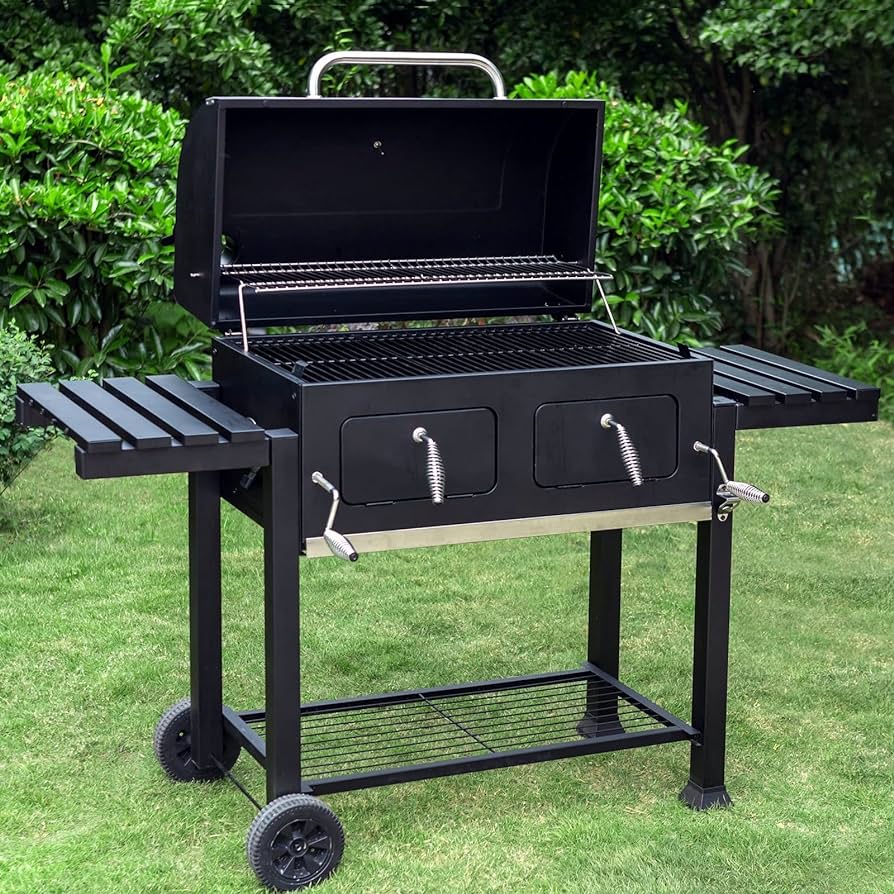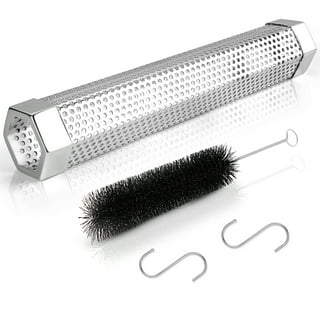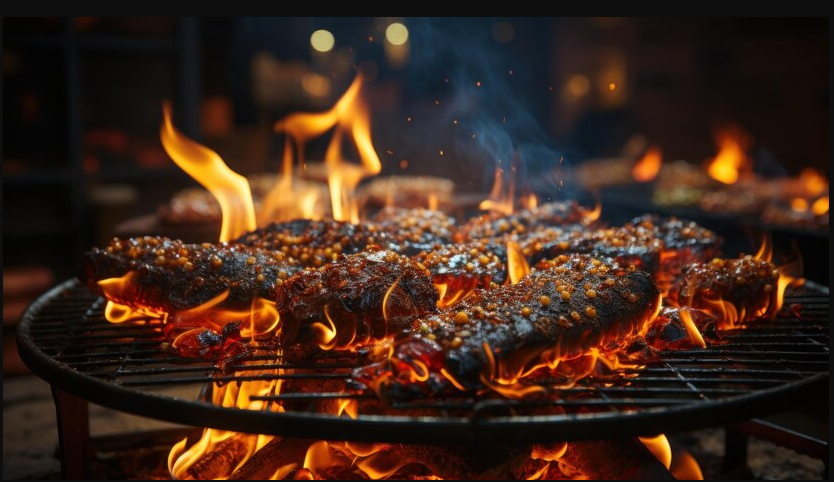Is Smoking Meat Healthier than Grilling?
Smoking vs Grilling: Pros and Cons of Both
When it comes to backyard barbecues, the smell of meats sizzling on the grill is a quintessential part of summer. However, using a smoker has become one of the staples for achieving that rich, woodsy flavor.
Smoking involves slow-cooking the meat until it falls apart and melts in your mouth, creating an unforgettable barbecue event.
On the other hand, grilling is about firing up the grill – a popular season activity, whether it’s a sunny day or a blizzard outside. It’s a time of year when snow can’t stop the Pit Barrel Cooker fans and enthusiasts of different types of cooking.
When asked which is better, the answer often depends on the preferences of the people involved and the specific cooking method used.
Each method has its unique appeal and health implications, making them both beloved choices for different reasons.
Smokers
When it comes to preparing meats, smokers offer a unique method, distinct from traditional grilling. In smokers, the smoke from burning wood or smoldering charcoal is used to cook meat or other foods, unlike a grill that cooks with direct heat and flames.
The process involves indirect heat, where the smoke is captured and the air temperature is controlled to be consistent, maintaining the desired temperature for the doneness level of the meat.
This method results in stronger flavors being infused into the fibers of the meat, creating a taste that’s deeply rich and satisfying. Smokers, therefore, offer a distinct culinary experience, different in technique and flavor from the direct heat of grilling.
Smokers – Pros
For meat geeks, a smoker often stands as a better option than a traditional grill, especially when it comes to cooking various types of meat. Smokers are revered for their ability to create a large smoke ring and intense flavor in the meat.
The slow cooking process, with precise controlling of the temperature, allows the fibers in tougher cuts of meat to break down gently, with the fat being reabsorbed, resulting in a rich and juicy outcome. The benefits of owning a smoker stand out prominently.
They operate at a lower cooking temperature, which helps to tenderize the meat without scorching the outside. Smoked foods tend to be more tender, juicy, and flavorful compared to those cooked on high heat.
This slow-cooking method effectively breaks down connective tissue and meat fibers, enhancing the taste and texture. Smokers allow for the use of different types of wood and seasonings, which, under long, slow cooking temperatures, develop complex flavors.
Many smokers are designed for a set-it-and-forget-it approach, making them convenient for long cooking processes. The quality of smokers means they can last a long time, representing a worthwhile investment for anyone serious about their barbecue.
Smokers – Cons
While smokers are highly versatile and capable of cooking various types of foods beyond just meat, they do come with their drawbacks. Despite their ability to reduce the toughness of cuts of meat, making them fall off-the-bone tender, one significant downside is their cost.
Smokers tend to be more expensive than grills, although they do last a long time. Smaller models might not yield as much food as one would like, and while delicious, the larger ones, like the Pit Barrel Cooker, come in various sizes and price points, which might not always fit everyone’s budget.
Moreover, the process of smoking requires more time and patience to figure out. For beginners, it might involve a steep learning curve, often requiring consulting a team or website for tips and tricks on how to get the kind of smoke and flavor desired.
This can be a significant factor for those looking for a quicker and more straightforward cooking method.
Grills

Grills typically operate at higher temperatures using direct heat. This method allows the meat to have direct contact with the flames, creating a browning effect at the point of contact.
As you cook the food on the rack above the heat source, which can be either wood or charcoal briquettes, the searing on the outside results in a charred exterior, offering a robust taste. Grilled meats, especially tender cuts like steak, benefit from this method.
Grills – Pros
One of the key advantages of grills is their ability to reach hotter temperatures, allowing for cooking outside while maintaining the interior temperature of the meat to your desired degree.
Grills are more versatile than smokers, making them ideal for a varied menu when entertaining. You can cook something different each night with relative ease of use.
Once you master the grill, you can enjoy healthy, homemade meals that are cheaper than those made by smokers. A starter grill is a great option for those with limited means.
Grills – Cons
However, food can easily burn on a grill, leading to a disappointing experience, especially after you’ve spent money on a nice steak. Cleaning is a constant task, involving scraping off debris from the grill rack after each use.
Also, you might find less flavor in the meat due to the shorter cooking time, as smoke tends to escape rather than being captured like in a smoker. The tender, juicy quality that is the hallmark of smoked meats is often less pronounced in grilled foods.
Clearing the Air on Cancer Risks of Smoked or Grilled Meats

With summer barbecues featuring juicy steaks and burgers, concerns often arise about whether grilled or smoked meats increase the risk of developing cancer.
Dr. Kathleen Egan, an epidemiologist at the Moffitt Cancer Center, highlights that higher levels of consumption of red meat are linked to chronic diseases. There’s convincing evidence of an association between colorectal cancer risk and intake of red meat.
A recent pooled analysis of 19 prospective studies found a 25% higher risk of colon cancer when comparing the highest and lowest levels of beef intake. These studies show an increased association of cancer not just with red meat but also with chicken and fish.
The mechanism explaining how red meat is associated with an increased colon cancer risk remains unknown.
Heme iron in red meat can cause DNA damage when cooked or preserved at high temperatures, such as grilling or frying, potentially elevating the risk. While there’s no definite conclusion, the debate continues as grilling and smoking processes, known for their charred appearance and smoky flavor, can generate potentially cancer-causing compounds in food.
Charred or blackened areas on the meat, especially in well-done cuts, contain heterocyclic and aromatic amines, while smoke can introduce polycyclic aromatic hydrocarbons that cling to the surface of the meat.
Continuing the discussion on the health aspects of processed red meats such as ham, sausages, bacon, and hot dogs, it’s important to consider the treatments used in curing and smoking.
These often involve chemical preservatives and additives to improve shelf life and taste. The problem is that these processes can introduce N-nitroso compounds, which studies have linked to an increased cancer risk.
To ensure safer summer grilling, it’s advised to keep the grill surface clean and use aluminum foil to avoid smoky flare-ups. Skip the lighter fluid and choose thinner cuts of meat that cook faster. Trimming the fat can reduce the amount of drip that can produce smoke.
It’s best to pass on the burnt ends and discard any charred or blackened areas on the meat. When cooking red meat, if it’s well done, consider skipping it to avoid meaty risks. Alternatively, turn to fresh fruits and veggies for a healthier summer meal.
Is Wood-Smoked Meat Bad for You?
Smoked and processed meats, particularly red meats, are associated with a higher risk of various health conditions, including Stroke, Heart disease, and Type 2 diabetes.
It’s important to consider these risks when incorporating smoked meats into your diet, especially in larger quantities or frequent consumption.
Is Smoked Meat Good for Weight Loss?
While smoked meat can be a perfect choice for a healthy snack, due to its high content of lean protein and being relatively low in fat and carbs, it’s packed with good smoky flavor and moisture, making it satisfying without the need for large portions.
This can be beneficial for those looking to maintain a balanced diet with controlled calorie intake for weight loss.
Healthiest Way to Smoke Meat
For the healthiest way to smoke meat, using hardwoods for Home smokers is crucial. Care should be taken to choose the right wood, avoiding those with resins like pine and other softwoods.
Culbertson advises sticking to white meats and Going lean. Don’t smoke fish too often, and Avoid burning the meat. A good compromise can be using liquid smoke to impart flavor without the risks associated with traditional smoking methods.
Are Pellet Smokers Healthier?
Pellet smokers are considered healthier compared to traditional wood chips or charcoal grills. Scientists have found evidence suggesting that pellet grilling is a healthier option among grilling methods.
This was further supported by an informal taste test article, pitting a pellet grill against a charcoal grill, which showed mixed results, indicating that pellet grilling can be a healthier and flavorful alternative.
You Can Make an Informed Decision on if Grilling or Smoking is Best
In the battle between grilling and smoking, each of these methods comes with its advantages and drawbacks. Grilling offers a faster and more convenient way to cook meat, delivering delicious, charred flavor and attractive grill marks.
It’s ideal for those who love a distinct, smoky taste and enjoy seeing the results of their cooking relatively quickly. On the other hand, smoking uses a longer, slow-cooking process that tenderizes the meat and imbues it with a unique flavor, depending on your choice of wood.
The decision ultimately boils down to the type of personal preference and desired outcome you are seeking. If you’re after a quicker, high-heat cooking method, grilling might be your go-to.
However, if you appreciate the art of slow cooking and the complex flavors it brings, smoking could be more your style.
Lean towards experimenting with techniques and various recipes to determine the best fit for your taste buds and cooking preferences.
Conclusion
In conclusion, when comparing smoking and grilling, each method has its unique health implications. Smoked meats, especially healthier options like turkey breast can be a better choice for maintaining a lower calorie intake. However, it’s crucial to consider the risks associated with certain cooking methods.
Pre-cooking meat before smoking can reduce health concerns such as stomach infections and cancer risks associated with toxins released during the smoking process.
Ultimately, the decision between smoking and grilling should be based on personal health considerations and culinary preferences, with an emphasis on safe cooking practices and choosing healthier meat options.
People also ask
What Meat is the Healthiest to Smoke?
For those seeking a guide to healthier fatty meat options for smoking while wanting to maintain a lower calorie count, there are several choices to align with the preferences of barbeque lovers.
Some of the best picks include Turkey breast, Flank steak, Pheasant, and Top sirloin steak. These meats offer a balance of flavor and health benefits, making them ideal for health-conscious smokers.
Is it Better to Smoke Meat Raw or Cooked?
Pre-cooking before smoking is a great way to make smoked meat both hassle-free and safer. It’s important to fight against major health concerns associated with smoked meats.
Research proves that eating smoked meat that’s pre-cooked can increase the chances of stomach infections and cancer due to the toxins released during smoking, which can be more toxic when applied to raw meats. Thus, pre-cooking can mitigate some risks associated with the smoking process.





